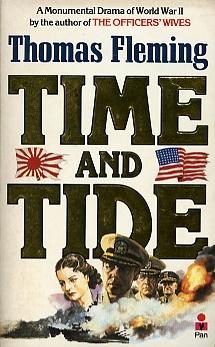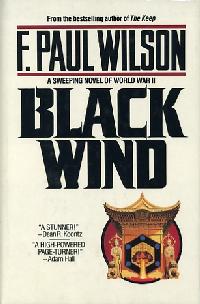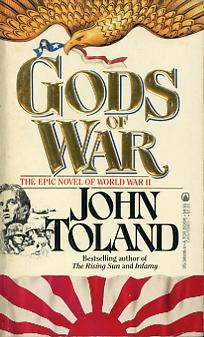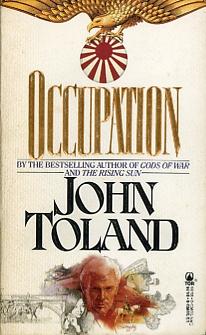Four Pacific War sagas
Revisionist thrills and silly plots
By William Wetherall
First drafted 30 January 1989
First posted 30 July 2006
Last updated 1 August 2006
John Toland, Gods of War, 1985
John Toland, Occupation, 1987
Thomas Fleming, Time and Tide, 1987
F. Paul Wilson, Black Wind, 1988
Revisionist fiction
The 1980s witnessed a surge of histories and novels that sought to change orthodox views of Pearl Harbor and the Pacific War. Some of the revisionist histories and novels were written by authors.
Revisionist fiction about Pearl Harbor spins the usual tales of international rivalry, romance, and intrigue, while at least partly blaming the United States for Pearl Harbor. Revisionists, such as John Toland, argue on the basis of controversial historical evidence that Franklin D. Roosevelt and others provoked Japan into attacking the United States in order to shock the US out of its isolationist stance toward the war in Europe.
Revisionist fiction about the Pacific War itself may indict the United States for dropping atomic bombs on Hiroshima and Nagasaki, or censure the way it conducted war crimes tribunals and other affairs related to the occupation. The wartime internment of Japanese immigrants and Americans of Japanese ancestry has long been regarded as wrongful, but revisionist novelists are more likely to tie the mass relocations to the other issues.
Not all the novels reviewed here are categorically revisionist, but all reflect more recent views of the past. All four employ the usual peeping tom and eavesdropping strategies by fictional characters to reveal what the authors want readers to know about the Pacific War. But not all four are equally compelling as tales or equally credible as history.
John Toland John Toland John Toland, essentially an historian, won a Pulitzer Prize in 1971 for The Rising Sun: The Decline and Fall of the Japanese Empire, 1936-1945 (New York: Random House, 1970). He had previously written But Not in Shame: The Six Months After Pearl Harbor (New York: Random House, 1961), and later wrote Infamy: Pearl Harbor And Its Aftermath (New York: Doubleday, 1982), which established him as a revisionist. Gods of War (1985) and Occupation (1987) are about the same two families, one American, the other Japanese. The daughter of the American family is married to the son of the Japanese family. The Gods of War follow the families from Pearl Harbor to Nagasaki. Occupation picks up their sagas during the Tokyo War Crimes Tribunal. Confusing fiction and historyBoth novels showcase Toland's revisionist research. The first three or four pages of both present long lists of characters under the headings "Fictional" and "Historical". Such lists may prevent some readers from rushing to their "Who's Who in WWII" for more information on characters like "Hose Nose" McGee and Major Susumu "Gentleman Jim" Watanabe (Gods of War) and Lieutenant Colonel Henry "Hanging Harry" Chestnutt and Fumiko Kano Matsutani (Occupation) -- while assuring them that President Harry S. Truman was for real. But they may also lead some readers to believe that the historical characters are more credible than the fictional ones. The historian in Toland also compelled him to name his human and archival sources of information at the end of both novels, and to make other comments that show he did his homework. But none of this clarifies what is definitely history, what is possibly history, and what is purely Toland. Uninspired awkwardnessToland's prose stirs as much affect as his character lists. And some of his phrasing is simply incoherent. From the first few pages of Occupation come several remarks like these.
Both Gods of War and Occupation share, with Time and Tide and Black Wind, the propensity of such fiction to spread misinformation about Japan in the course of larding the narrative with tourguidesque commentary on the country's society and people. |

Thomas Fleming Thomas Fleming, also an historian, does not the historicalness of Time and Tide (1987) an issue. In a single page of acknowledgements at the end, he gives only the legally minimum credits for the lines of poetry and the song lyrics he cites in the novel. His silence on whether his characters are fictional or historical suggests that he does not want his story, however accurate parts of it may be, to be confused with history. McKay and McVayThe difference between history and fiction is often just a name. In Time and Tide, Fleming fictionalizes history by changing the name of a ship and a single letter in the name of its captain. A curious reader not familiar with the Pacific War will want to know if Fleming's Jefferson City was a real ship, and if Captain McKay was its captain. Pick up almost any book on the naval war in the Pacific or on the bombing of Hiroshima, and it will be immediately clear that the Jefferson City is modeled after the Indianapolis, the heavy cruiser that transported the Enola Gay bomb from San Francisco Naval Shipyard to Tinian via Pearl Harbor, and was sunk on its unescorted, sleepy voyage to Leyte by submarine commander Mochitsura Hashimoto's torpedoes. But Fleming's fictional disguise of the ill-fated ship's captain is dangerously thin. McKay of the Jefferson City is a bit too close to McVay of the Indianapolis. The real-life McVay was rescued after four days in the water with one-fifth of his crew, and then was court-martialed for carelessly losing his ship and nearly 1,000 men. Fleming's McKay is a brooding warrior whose death wish is heroically fulfilled when he orders his executive officer to abandon ship rather than stay to pry open the buckled hatches of the cabin where he had been sleeping. More irony in real historyThe Indianapolis appears under its real name in F. Paul Wilson's Black Wind (1988). The ship's mission is central to Wilson's story, but he fails to reveal its after arriving in Tinian. Fleming, to his credit, conveys the sense of irony that the ship which helped deliver the weapon which so atrociously hastened the end of the war became "the last major vessel to be lost in World War II, and the victim of the greatest disaster at sea in the history of the U.S. Navy" (Thomas and Witts, Enola Gay, 1977). But Fleming's story unfolds entirely through the eyes of the Jefferson City crew. Hashimoto and his submarine manifest only as they did to the crew, as two unexpected explosions in the middle of a calm night. However, Fleming's fictional account of the Independence constitutes a highly romantic departure from the fate of its real-life captain. In restricting his narrative viewpoint, he fails to reveal the historically greater irony that Hashimoto was brought to the United States in December 1945, four years after Pearl Harbor, to testify in McVay's court martial. Narrative viewpointTime and Tide comes the closest to being a good novel. Fleming shows the Pacific War through the eyes of different people who are literally on the same boat. By shifting the narrative view between ordinary crew members and officers, he portrays both the rivalry and incompetency in higher command, and the mutinous conflict in the lower ranks. Though this sort of narrative device is hardly original, Fleming uses it to great effect.
The life-probing, death-querying, war-questioning thoughts Fleming puts in the minds of his principle characters may at times seem contrived. Yet they also help make his novel by far the most dramatic and gripping of the four. |

F. Paul Wilson F. Paul Wilson, a wonderful story teller, is best known for horror thrillers like The Keep (1981) and The Tomb (1984), and for the less horrific but equally paraphenomenal The Touch (1986). Black Wind (1988), too, is more in the vein of an historical thriller with supernatural twists. Identity and loyaltyWilson's plot, which unwinds from Pearl Harbor to Hiroshima, is on the fantasy side of history and behavior but is seriously overcooked. Matsuo Okumo, who was raised in the United States, is despised in both countries. His loyalties are further confused when he falls in love with Meiko, the bride-to-be of his favored brother Hiroki, who was raised in Japan and is being groomed for Yamato greatness. And they are totally betrayed when he learns that Meiko, while in America to study, has fallen in love with his best American friend, Frank Slater. "Oriental mysticism" and "Western science"Without giving the extremely convoluted plot away, let me simply suggest its utter silliness with this quote from the flap of the dust jacket (bold purple emphasis mine).
I wonder what sort of yarns a Japanese novelist with Wilson's bent of mind would have spun had Hiroki succeeded in rediscovering the secret of the Black Wind. |

